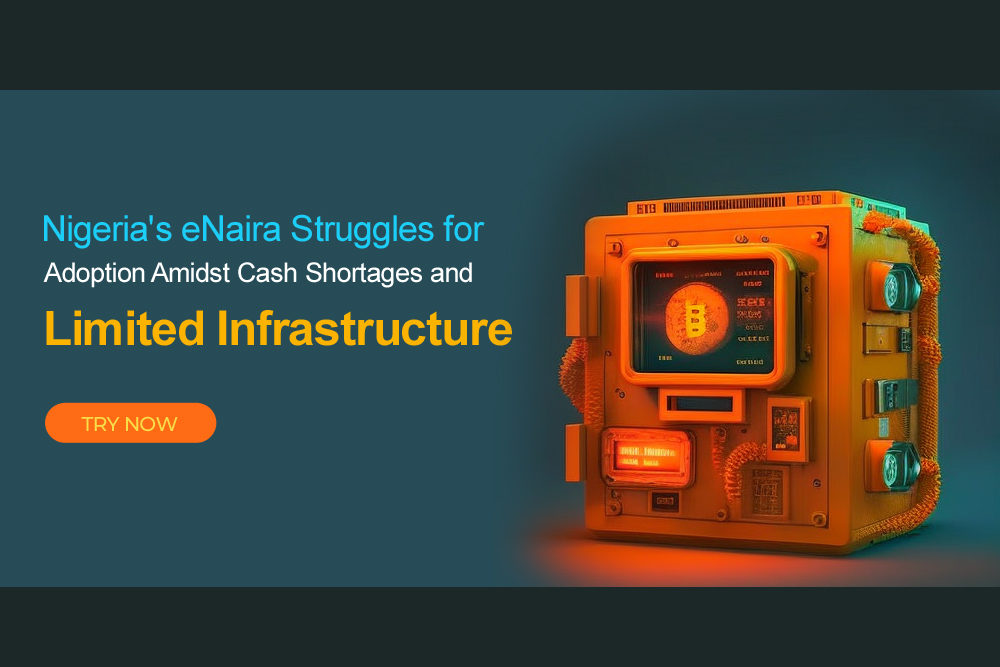
The adoption of national digital currencies has the potential to transform the financial landscape and create a more equitable financial system. Yet, as demonstrated with the eNaira in Nigeria, adoption can be slow due to a lack of infrastructure and knowledge.
Lack of infrastructure to support the ecosystem
The insufficient infrastructure to support the eNaira is one of the key reasons for its sluggish acceptance in Nigeria. Users must have a smartphone and internet connectivity to use the digital money, which can be difficult in a country where only 25 to 40 million people own a smartphone. This is worsened by the absence of reliable internet connectivity, particularly in rural regions. To achieve widespread use of digital currencies, there must be a concerted push to expand internet connectivity and smartphone usage, particularly in disadvantaged areas.
Barriers to Adoption
In addition to technical issues, there is a major dearth of education in Nigeria on the benefits of digital currencies. Many individuals are still wary of digital currencies’ security and trustworthiness, and there is a widespread lack of understanding about how they work. Governments and institutions must invest in education initiatives to raise knowledge about the benefits of digital currencies and how to successfully use them.
Another barrier to adoption is the absence of transaction options and retailers ready to take digital currency. Despite efforts by the Central Bank of Nigeria to encourage banks to promote the use of eNaira, merchant acceptance remains low. This limits digital currencies’ utility, particularly for ordinary retail transactions. Governments and organizations must collaborate to encourage merchant adoption by providing incentives like as cheaper transaction fees or tax advantages.
Furthermore, Nigeria is currently experiencing acute cash shortages, which has resulted in riots and protests across the country. While the eNaira has the potential to be a solution to the issue, its low adoption and infrastructure challenges have limited its utility. Governments and organizations must move quickly to address these concerns and make digital currencies widely available as a cash substitute.
Digitalization
As the world grows more digital, the advantages of national digital currencies cannot be overlooked. Digital currencies provide several benefits, such as speedier transactions, improved security, and lower expenses. They can also help people gain financial inclusion, especially those who are underserved by traditional banking institutions.
But, in order for digital currencies to become a viable alternative to cash, governments and institutions must take meaningful actions to overcome adoption barriers. This involves infrastructure investments, education efforts, and incentives for merchant adoption. Furthermore, there must be a concerted effort to resolve public concerns about security and reliability, as well as to create public trust in digital currencies
The Central Bank of Nigeria’s attempts to promote the eNaira have been well-intentioned, but more has to be done to remove the barriers to acceptance. This includes collaborating with mobile network providers to promote internet access and smartphone penetration, collaborating with retailers to incentivize eNaira use, and investing in public awareness education programs.
Another possibility is to use blockchain technology to develop a decentralized digital currency. Because blockchain technology is known for its security features, this could help alleviate concerns about security and reliability. Furthermore, because it does not require a centralized body to oversee its use, a decentralized digital currency may be more accessible and inclusive than a centralized one.
Final thoughts
To conclude, while the adoption of national digital currencies such as the eNaira has been delayed in Nigeria, the potential benefits cannot be overlooked. Adoption problems must be solved immediately to ensure that digital currencies can deliver on their promise of building a more egalitarian financial system. To promote the use of digital currencies, governments and organizations must collaborate to invest in infrastructure, education, and incentives. This will necessitate considerable effort and collaboration on the part of several parties, including regulators, financial institutions, mobile network carriers, and merchants.
As the world moves toward a more digital economy, we must embrace the promise of digital currencies to establish a more inclusive financial system. The difficulties encountered in Nigeria’s adoption of the eNaira show the necessity for a concerted effort to overcome the infrastructure and education issues that can stymie adoption. Governments and institutions can collaborate to create an environment that supports the widespread adoption of digital currencies, resulting in a more inclusive and accessible financial system for all.
Open your free digital wallet here to store your cryptocurrencies in a safe place.